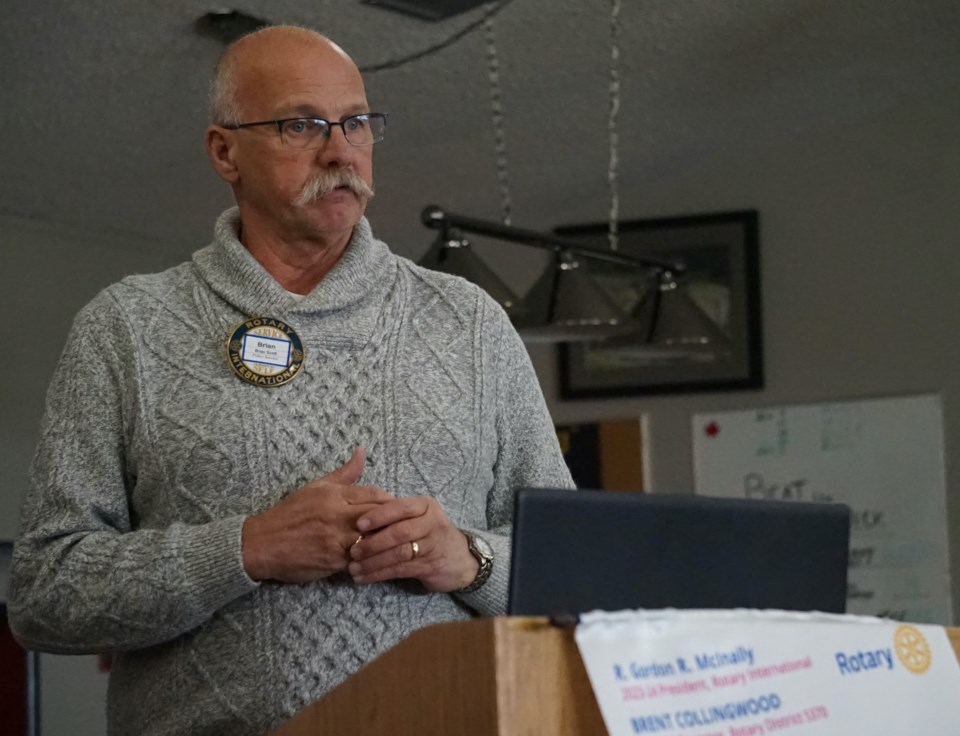ATHABASCA — Renewed community interest in helipad projects in the region has led to revitalized talks between local stakeholders and AHS. While the roadblocks previously encountered during initial helipad efforts in 2019 haven’t disappeared, local officials have expressed confidence about the chances of success this time around.
“There’s lots of questions and lots of work to do, but I don’t have any doubt that as a community we can pull this off,” said Athabasca County Reeve Brian Hall.
Hall joined Athabasca Rotary club member Brian Scott at the Legion Wednesday, Jan. 10, to provide other local Rotarians and their guests with an update on the projects, which were picked up again in late 2023.
“We’re trying to do two projects at once here,” said Scott. “The Boyle project is quite a bit different than ours. It’s going to be an elevated pad … right on AHS property. (The Athabasca) pad will be ground-level and is on town-owned property.
“Big difference, but we want to hit them both at the same time. Both communities need it — there have been some incidents, whether it be car crashes or other personal health issues, where ambulances haven’t been available or have been available very delayed,” said Scott.
After a Dec. 13 meeting between AHS and local stakeholders from Athabasca and Boyle, Hall said the feedback from AHS was encouraging, and hopes for cooperation are high — but obstacles for the projects still exist at a federal level.
“There’s a lot of moving parts,” said Hall. Another Rotarian who attended the Dec. 13 meeting said changes in federal regulations since the region’s last attempts to get both helipads operational could prove to be the final hurdle.
“That is the critical piece, is that you’re able to be certified by Nav Canada and then you’re good to go,” said Hall.
Cost conversations
An assessment of the hospital site was conducted in 2015 to identify locations in the Athabasca Health Care Centre grounds where a helipad could be built after Transport Canada informed the county air ambulances could not land more than once at the same uncertified helipad.
Although the lay of the land hasn’t changed since the first study was done, Scott said AHS will require new assessments, which will come with a price tag around $20,000 for both Boyle and Athabasca sites. AHS will only recognize assessments completed by RGHeliservices Consulting Inc, headed by former Transport Canada helipad inspector Ron German.
Scott said a meeting with the consultant will be scheduled before the end of January, although no firm date has been set, and Hall said discussions on where the funds to pay for the new study will come from are still to come.
“I think that’s one of things that we may need to look to the community and the municipalities (for),” said Hall. Community-led committees for both projects are in the process of being formed in both Athabasca and Boyle.
Hall said during budget discussions, county councillors expressed support for the projects, and while no set dollar amount was included in the 2024 budget, further discussions around funding will be had.
He said financial support from the county, “Would have to be based on knowing the dollar amount and having a formal request from the community committee.”
Project renewal recap
Recent examples of similar projects include a helipad built in Valleyview, Alta., a town located between Slave Lake and Grande Prairie, as well as one in Innisfail. The Innisfail helipad was officially opened in November 2022, and Glenda Farden, senior municipal relations liaison for STARS said the project cost the region around $800,000.
Farden was joined by Jon Gogan, STARS pilot and provincial operations director in September 2023 to give a presentation to Rotary members on what it would take to get the projects up and running.
“Depending on if you decided you were going to do lighting, or if you wanted to do a heated pad, you’re looking at over $1 million, so those are other aspects you might want to consider,” said Farden.
The initial efforts to build a certified helipad in 2019 were community-driven, and local officials are hoping to see a similar drive for the renewed attempts.
“I’m an optimist,” Athabasca mayor Rob Balay told the large gathering at the September Rotary meeting. “I’ve been approached by so many of the businesses in town that said, ‘We can do this, let’s get this done, we just need the opportunity to do that.’”
“I see heliports as infrastructure in the same way that airports supports a community,” said Gogan during the September STARS presentation. “I see a heliport as a location to rendezvous and improve patient care outcomes.” He added the financial investments are worth saving lives and lessening costs for the healthcare system down the road, a sentiment Hall echoed in January.
“I can tell you that some of the most powerful people in the room are the residents, the nurses and the doctors,” added Gogan.
“If you come to the ministry as an advocate for your own community, and say, ‘We have business partnerships, mayor, community, county, willing to foot the bill, here’s what we need from you — it’s a minimal cost,’ I would find it hard to say no,” said Gogan.



